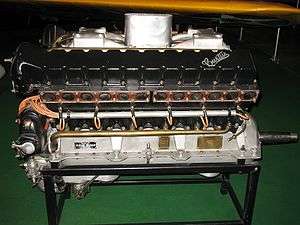Curtiss D-12
| D-12/Felix | |
|---|---|
 | |
| Preserved D-12 engine | |
| Type | V-12 piston engine |
| Manufacturer | Curtiss Aeroplane and Motor Company |
| First run | 1923 |
| Developed from | Curtiss C-12 |
The Curtiss D-12, sometimes identified with the military designation Curtiss V-1150, was an aircraft engine of 18.8 liter displacement. It was a water-cooled V12, producing 443 hp (330 kW) and weighing 693 lb (314 kg). It was designed by Arthur Nutt in 1921 and used in the Curtiss CR-3 for the 1923 Schneider Trophy race. Fairey Aviation of England imported 50 Curtiss-built examples in 1926, renaming them the Fairey Felix.[1][2]
The D-12 was one of the first truly successful aluminum cast-block engines, and was extremely influential in the interwar period. Numerous subsequent engines trace their design to the D-12, among them the Packard 1A-1500, Rolls-Royce Kestrel and Junkers Jumo 210.
Applications
D-12
- Boeing Model 15
- Curtiss CR
- Curtiss Falcon
- Curtiss P-5
- Curtiss PW-8
- Curtiss R2C
- Fokker D.XII
- Macchi M.33
- Wittman D-12 Bonzo
Felix
Specifications (Curtiss D-12/Felix)
Data from Lumsden[3]
General characteristics
- Type: 12-cylinder liquid-cooled 60-degree V
- Bore: 4.5 in (114.3 mm)
- Stroke: 6.0 in (152.4 mm)
- Displacement: 1,145 cu in (18.8 l)
- Length: 56.75 in (1441 mm)
- Width: 28.25 in (717.5 mm)
- Height: 34.75 in (882.6 mm)
- Dry weight: 693 lb (314 kg)
Components
- Cooling system: Liquid-cooled
Performance
- Power output: 443 hp (330 kW) at 2,200 rpm
- Compression ratio: 6:1
See also
- Comparable engines
- Related lists
References
Notes
Bibliography
- Lumsden, Alec. British Piston Engines and their Aircraft. Marlborough, Wiltshire: Airlife Publishing, 2003. ISBN 1-85310-294-6.
External links
| Wikimedia Commons has media related to Curtiss D-12. |
- Great Aircraft Engines - Curtiss D-12
- "The Curtiss Model CD-12 400 H.P. Aero Engine" a 1922 Flight article on the CD-12
This article is issued from
Wikipedia.
The text is licensed under Creative Commons - Attribution - Sharealike.
Additional terms may apply for the media files.